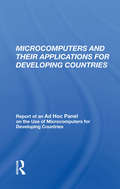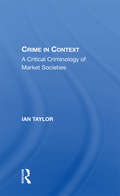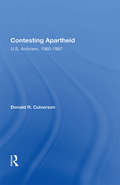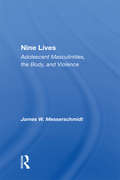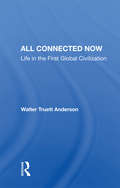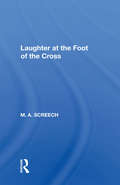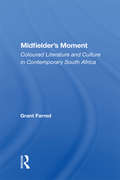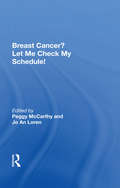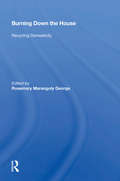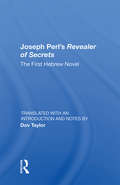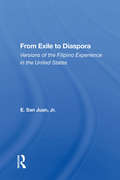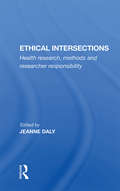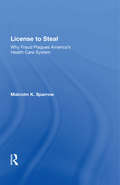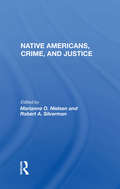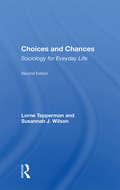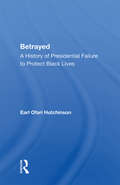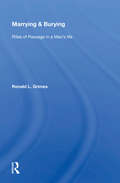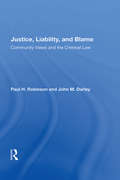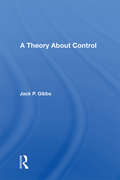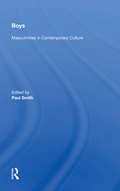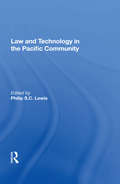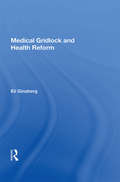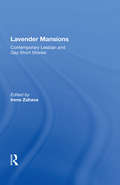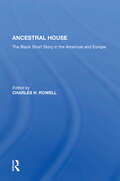- Table View
- List View
Microcomputers And Their Applications For Developing Countries
by National Research Council Office of International Affairs Board On Science Technology for International DevelopmentMicrocomputers are an increasingly important tool in all aspects of development as the need to handle and assimilate vast quantities of information becomes ever more critical for both the international development community and the developing countries. In addition, the microcomputer represents the first significant technological advance that a dev
Crime In Context: A Critical Criminology Of Market Societies
by Ian TaylorAt the end of the twentieth century, the bookstores are full of books on crime, though this title will certainly not find a place on the same shelves. In the massive Waterstones bookstore in the city of Manchester, England, where I lived through most of the 1990s, the ground floor display area was rearranged in 1995 so as to accommodate, right at the front of the store, several hundred new titles, on topics like Serial Murderers and Sexual Crimes of the Twentieth Century.l Several of these new books are companion volumes to movies on release in the city's cinemas or, in some instances, are simply the original text on which the movies are based. The movies in question - Shallow Grave, Silence of the Lambs, Reservoir Dogs, Natural Born Killers and others - focus heavily on interpersonal violence and murder and also place great emphasis in the manner of many earlier cinematic genres - on the idea of the 'criminal mind' (not least, as a way of dramatizing the detection of the originating criminal act) but also - to a significant extent, these are movies which emphasize the idea and contemporary social presence of evil. Similar moral and psychologistic preoccupations are now also widely apparent on primetime television - most notably, in Britain, in the extraordinarily powerful Cracker series, produced by Granada Television in 1994 and 1995, watched by over 15 million people, and featuring, inter alia, the forensic investigation' of serial and sexual murders, some of them extremely graphically displayed (Crace 1994).2 The prominence of 'Gothic' themes in movies about violent death is not new in itself: there is a long history of interest in the cinema in horror and, indeed, in 'transgression' and evil. What may be definitive about the present genre of movies as well as the range of fictional and non-fictional titles in the bookstores about crime is the overwhelming focus on murder and killing represented in very contemporary and mundane, ordinary and, indeed, 'respectable' settings, and the powerful suggestion that these movies are a representation of the risks and dangers involved in everyday life at the end of the twentieth century. The bookstore display in Waterstones is straightforwardly called the 'Real Crimes' section.
Local Parties In Political And Organizational Perspective
by Martin R. SaizAnalyzes relations between political party systems and local communities in the United States, Canada, Great Britain, Germany, Italy, and other nations. This book addresses an almost completely neglected branch of community politics: the comparative analysis of local political systems. Accordingly, Local Parties in Political and Organizational Perspective opens new views to a variety of relations between political systems and local communities in the United States, Canada, Great Britain, Italy, Germany, and other nations. The authors unite specific national case studies with an original theoretical framework, resulting in an anthology with uncommon coherency. Theoretical generalizations are tested with cross-national data; each case study, in turn, demonstrates a localized version of the larger framework, using specific historical political outcomes as examples. This book addresses an almost completely neglected branch of community politics: the comparative analysis of local political systems. Accordingly, Local Parties in Political and Organizational Perspective opens new views to a variety of relations between political systems and local communities in the United States, Canada, Great Britain, Italy, Germany, and other nations. The authors unite specific national case studies with an original theoretical framework, resulting in an anthology with uncommon coherency. Theoretical generalizations are tested with cross-national data; each case study, in turn, demonstrates a localized version of the larger framework, using specific historical political outcomes as examples. Local Parties in Political and Organizational Perspective argues that local political parties should be understood as Janus-faced: components of nationally encompassing organizations on the one hand, and specific actors in community politics on the other. As such, local parties necessarily act as the primary democratic institutions that link ordinary citizens to local governmental institutions, and transitively to the national political system. By linking ordinary citizens and the most basic local organizations with national politics, Local Parties in Political and Organizational Perspective adds significantly to the collective understanding of the nature and status of local parties in mature and developing democracies
Contesting Apartheid: U.S. Activism, 1960-1987
by Donald R. CulversonThis book examines how U.S. citizen groups have been drawn to the issue to develop more comprehensive explanations of American connections to the production and distribution of wealth and poverty in southern Africa and to expand options for transnational citizen activism.
Nine Lives: Adolescent Masculinities, The Body And Violence
by James MesserschmidtSociologists and criminologists have long known that there is a relationship between masculinity and crime, for gender has been advanced consistently as the strongest predictor of criminal involvement. Nine Lives, written by one of the most respected authorities on the subject of gender and crime, provides a fascinating account of the connection am
All Connected Now: Life In The First Global Civilization
by Walter Truett AndersonGoing beyond the narrow economic focus common to most books about globalization, All Together Now describes four kinds of global change-economic, political, cultural, biological-all of which are now accelerating, driven by the increasing mobility of symbols, goods, people, and non-human life forms. Anderson describes how we are entering an age of o
Laughter At The Foot Of The Cross
by M.a. Screech"Christian laughter is a maze: you could easily get snarled up within it." So says Michael A. Screech in his note to readers preceding this collection of fifty-three elegant and pithy essays. As Screech reveals, the question of whether laughter is acceptable to the god of the Old and New Testaments is a dangerous one. But we are fortunate in our gu
Midfielder's Moment: Coloured Literature And Culture In Contemporary South Africa
by Grant FarredA timely exploration of and intervention into the South African ideological landscape from the perspective of the colored community. In Midfielders Moment, Grant Farred explores the ways in which political fissures are being articulated in the new South Africa. By examining the politics, literature, and culture of an historically disenfranchised c
Breast Cancer? Let Me Check My Schedule!: Ten Remarkable Women Meet The Challenge Of Fitting Breast Cancer Into Their Very Busy Lives
by Peggy MccarthyThey come from different backgrounds and from professions as varied as medicine, education, and entertainment, but these ten women share one thing in common: They all have breast cancer. This book describes their experiences, exploring their initial fear, rage, and uncertainty, and reveals how each eventually coped, in her own way, with her diagnos
Burning Down The House: Recycling Domesticity
by Rosemary Marangoly GeorgeThis book views domesticity through multiple frames and surveys the rhetoric and practices of domestication in contemporary cultures. It also examines the consequences and costs of homemaking in various geographic and textual locations.
Joseph Perl's Revealer Of Secrets: The First Hebrew Novel
by Dov TaylorThe dawning of the nineteenth century found the Jews of Eastern Europe torn between the forces of progress and reaction as they took their first tentative steps toward the modern world. In a war of words and of books, Haskaia–the Jewish Enlightenment–did battle with the religious revival movement known as Hasidism. Perl, an ardent advocate of Enlightenment, unleashed the opening salvo with the publication in 1819 of Revealer of Secrets. The novel tried to pass itself off as a hasidic holy book when it was, in fact, a broadside against Hasidism–a parody of its teachings and of the language of its holy books. The outraged hasidim responded by buying up and burning as many copies as they could. Dov Taylor's careful translation and commentary make this classic of Hebrew literature available and accessible to the contemporary English-speaking reader while preserving the integrity and bite of Perl's original. With Hasidism presently enjoying a remarkable rebirth, the issues in Revealer of Secrets are all the more relevant to those seeking to balance reason and faith. As the first Hebrew novel, the work will also be of great interest to students of modern Hebrew literature and modern Jewish history.
From Exile To Diaspora: Versions Of The Filipino Experience In The United States
by E. San JuanThis book includes essays of the narrative of Filipino lives in the United States to provoke interrogation of the conventional wisdom and a critique of the global system of capital. It helps in constituting the Filipino community as an agent of historic change in a racist society.
Ethical Intersections: Health Research, Methods And Researcher Responsibility
by Jeanne DalyThis book presents a collection of essays that aims to make public the social discourse on ethics of health research used by responsible, practising researchers in order to demonstrate the detailed and fine consideration given to the ethics of the research task.
License To Steal: How Fraud Bleeds America's Health Care System, Updated Edition
by Malcolm K. SparrowThis book brings an unusual opportunity to explore the peculiarities of America's health care industry's approach to fraud control, when compared with the financial services sector, credit card companies, or the Internal Revenue Service—all of which have to defend themselves against fraud.
Native Americans, Crime, And Justice
by Marianne O. NielsenThe historical involvement of Native peoples within the criminal justice system is a narrative of tragedy and injustice, yet Native American experience in this system has not been well studied. Despite disproportionate representation of Native Americans in the criminal justice system, far more time has been spent studying other minority groups. Nat
Choices And Chances: Sociology For Everyday Life, Second Edition
by Lorne TeppermanChoices and Chances is an ideal supplement to introductory textbooks. By showing how theories can apply to everyday life, it demonstrates the ways sociology—a living, growing discipline—can shed light on issues of immense personal and social importance.
Betrayed: A History Of Presidential Failure To Protect Black Lives
by Earl Ofari HutchinsonIn this timely and eye-opening book, noted political analyst and media commentator Dr. Earl Ofari Hutchinson traces the root cause of the White House's failure to protect the rights of African Americans. Drawing extensively from public and private presidential papers, private correspondence, personal interviews, and national archive documents, Hutchinson gives a rich historical account of the racial philosophy, policies, and practices of successive presidents from Warren G. Harding to Bill Clinton. Franklin D. Roosevelt is one example. The popular view is that Roosevelt was a Mend to blacks because of his enactment of New Deal programs. But he was also a prisoner of the biased racial thinking of his times. He refused to actively support antilynching legislation and repeatedly curried political favor with racist southern Democrats. Lyndon B. Johnson is yet another example. He is known as a champion of civil rights, but Hutchinson details two crucial moments when Johnson shrank from using the full force of executive power to push Congress to enact new and tougher federal criminal civil rights statutes to punish racist violence. In this book, Hutchinson reveals that no American president has ever signed into law a federal antilynching bill despite a 50-year campaign by the NAACP for presidential and congressional action. He documents how Nixon, Reagan, and Bush rolled back civil rights and affirmative action, failed to fully enforce equal protection provisions of the Fourteenth Amendment against police abuse and racial violence, encouraged conservative legal obstructionism, and fueled the rise of a repressive domestic security state. These actions in turn have reinforced institutionalized racism and continued the historical pattern of devaluing black lives in law and public policy. Finally, Hutchinson warns that the century-old failure by the White House to enforce federal law to protect black lives still has dangerous consequences for American society.
Marrying & Burying: Rites Of Passage In A Man's Life
by Ronald L. GrimesSignificant life passages are marked by ritual in virtually every culture. Weddings and funerals are just two of the most institutionalized yet troubled ones in our own society. A wide variety of rites, both traditional and invented, also mark birth, coming of age, and other major transitions. In Marrying & Burying Ronald Grimes, a founder of the n
Justice, Liability, And Blame: Community Views And The Criminal Law
by Paul H. RobinsonThis book examines shared intuitive notions of justice among laypersons and compares the discovered principles to those instantiated in American criminal codes. It reports eighteen original studies on a wide range of issues that are central to criminal law formulation.
A Theory About Control
by Jack P. GibbsMoving beyond his 1989 book, Control: Sociology's Central Notion, Jack Gibbs develops in this new book a comprehensive theory of control in all its biological, technological, and human dimensions. His treatment goes beyond conventional ideas about social control to show why self-control and proximate control are essential to understanding human interaction. He also argues that thinking of control in terms of the counteraction of deviance is insufficient. Tests of Gibbs's control theory, based on data from sixty-six countries, add credence to his claim that control could be the central notion for sociology and perhaps for other social sciences.
Boys: Masculinities In Contemporary Culture (Cultural Studies)
by Paul SmithAnalyzing the meanings of masculinity in contemporary culture, this book examines specific cultural male icons like Muhammad Ali, Harvey Keitel, Jean-Claude Van Damme, and Newt Gingrich and explores the male stereotypes such as the cowboy, the father, the homosexual, and the Black terror.
Law And Technology In The Pacific Community
by Philip S.C. LewisMost would agree that business and trade are now carried out in an international environment, but it is much less widely recognized that the practice of the law of business and technology is also becoming internationalized. Indeed, in many ways we seem to be rapidly moving toward a world legal order that may parallel the world economic order. In th
Medical Gridlock And Health Reform
by Eli GinzbergThe early 1990s saw the U.S. health care system under intensifying pressures and strains as a consequence of steeply rising expenditures, an increase in the number of uninsured persons, and a range of other challenges, including increasingly severe pressures on government and employers, the principal payers for health care. As a consequence of thes
Lavender Mansions: 40 Contemporary Lesbian And Gay Short Stories
by Irene ZahavaGeorge Stambolian, Terri de la Peña, Audre Lorde, Paul Monette, Edmund White, and Jaime Manrique are just six of the writers represented in this collection of forty contemporary lesbian and gay short stories. Gathered together for the first time in one volume are writings by both lesbians and gay men who represent a multiplicity of ethnic and racial backgrounds. Irene Zahava has compiled a unique and necessary collection, selecting stories for their artistic power and for their treatment of topics that are significant in lesbian and gay life and politics today. An alternative thematic table of contents allows the reader to understand lesbian and gay life according to its most culturally and politically significant themes: childhood/growing up; coming out/finding community; families; oppression/resistance; bisexuality; relationships/friendships; AIDS; and aging/dying.
Ancestral House: The Black Short Story In The Americas And Europe
by Charles RowellAn anthology of 70 short stories by writers of African descent. The authors are from Europe and the Americas (about half of them from the United States), and they include Alice Walker, Hal Bennett and John Edgar Wideman.
